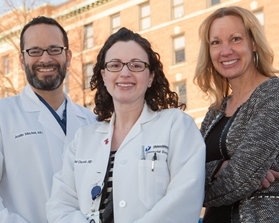|
From left: Justin Maykel, Jennifer Davids and JeanMarie Houghton |
Donor-funded research promises to be “the epitome of personalized cancer treatment”
Posted: March 2014
Personalized cancer treatment—therapy tailored to the unique genetic makeup of an individual’s tumor—is arguably the holy grail of cancer research today. Thanks to the generosity of a donor couple, UMass Memorial Medical Center and UMass Medical School are on the forefront of this quest with a project aimed at finding better treatments for colorectal cancers.
Physician-scientists at these two institutions are collaborating on research using humanized mice whose immune systems have been altered so that human cells can be implanted in them without being rejected. It’s an approach that promises to make possible “the epitome of personalized cancer treatment,” said Justin Maykel, MD, chief of the Division of Colon and Rectal Surgery at UMass Memorial.
“If we can take a tumor from a patient and grow it in one of these mouse lines, we can then treat the mice with different chemotherapy agents to see which one will work best for that patient’s specific tumor,” explained Dr. Maykel, also an associate professor of surgery at UMMS, who is collaborating with colleague JeanMarie Houghton, MD, PhD, of UMass Memorial’s Division of Gastroenterology and associate professor of medicine and cancer biology at UMMS. “Then we can offer it to the patient.
“This concept of a mouse avatar of a person sounds simplistic,” Maykel said, “but it hasn’t really been done since there haven’t been the right mouse lines to grow tumors in.” That is, until now.
Maykel’s and Dr. Houghton’s research is benefitting from the work of UMass Medical School Professor of Molecular Medicine Dale Greiner, PhD, who has developed unique strains of mice that can be implanted with human cells and tissues, including human immune systems.
“Typically, there is a time lapse between when a patient is diagnosed with colon cancer and when the patient is ready to receive chemotherapy,” said Maykel, explaining that most patients will first undergo surgery then have a four- to six-week recovery period. “That’s enough time for the research team to grow the patient’s tumor in one of these mice and determine which chemotherapy could work.”
Despite its tremendous promise, however, getting this research off the ground proved challenging for Maykel and Houghton, who are also working with Jennifer Davids, MD, a colorectal surgeon in Maykel’s division and assistant professor of surgery at UMMS.
“We struggled to get this project launched with National Institutes of Health funding,” said Maykel. “But due to sequestration and cutbacks, we kept hitting roadblocks.”
Enter a private donor couple, who wish to remain anonymous, who had an intensely personal interest in novel treatments for colorectal cancer.
“Unfortunately, these donors had lost a son to colorectal cancer,” said Maykel. “When we presented this research to them, they saw the potential and were willing to fund it to get our project up and running.
“We are doing novel, creative research right here in Worcester, developing new strategies for patients with colorectal cancer,” he added. “A single donation is making a real difference in helping to move it forward. One couple can have a tremendous impact.”
Story published in the Spring 2014 edition of the Your UMass medicine newsletter (pdf).


